鲁教版英语九年级下册教案
- 格式:docx
- 大小:267.39 KB
- 文档页数:105
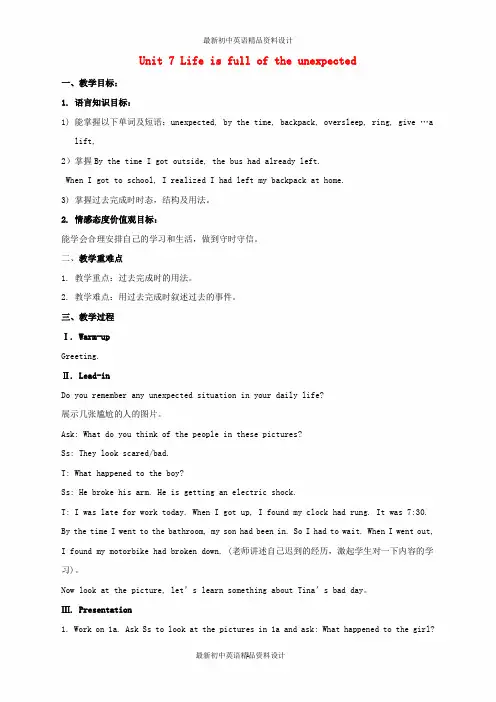
Unit 7 Life is full of the unexpected一、教学目标:1. 语言知识目标:1) 能掌握以下单词及短语:un expected, by the time, backpack, oversleep, ring, give …alift,2)掌握By the time I got outside, the bus had already left.When I got to school, I realized I had left my backpack at home.3) 掌握过去完成时时态,结构及用法。
2. 情感态度价值观目标:能学会合理安排自己的学习和生活,做到守时守信。
二、教学重难点1. 教学重点:过去完成时的用法。
2. 教学难点:用过去完成时叙述过去的事件。
三、教学过程Ⅰ. Warm-upGreeting.Ⅱ. Lead-inDo you remember any unexpected situation in your daily life?展示几张尴尬的人的图片。
Ask: What do you think of the people in these pictures?Ss: They look scared/bad.T: What happened to the boy?Ss: He broke his arm. He is getting an electric shock.T: I was late for work today. When I got up, I found my clock had rung. It was 7:30. By the time I went to the bathroom, my son had been in. So I had to wait. When I went out, I found my motorbike had broken down. (老师讲述自己迟到的经历,激起学生对一下内容的学习)。
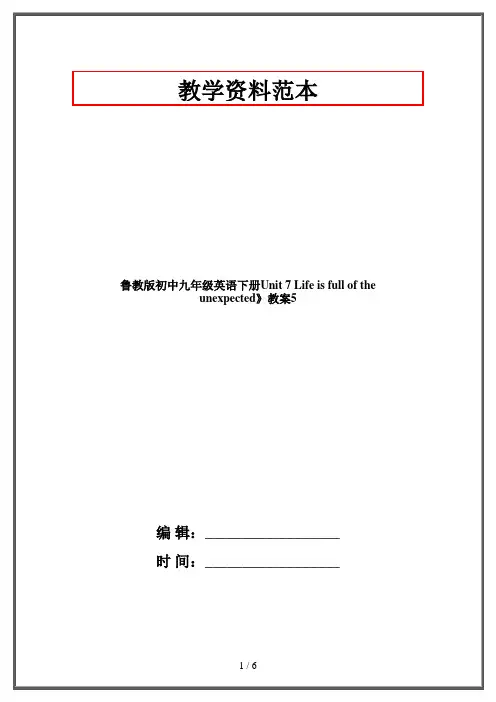
Unit 7 Life is full of the unexpected一、教学目标:1. 语言知识目标:1)掌握本单元基础知识, 掌握过去完成时的结构和用法。
2)能够根据所学知识进行写作, 提高学生的写作能力。
2. 情感态度价值观目标:二、教学重难点过去完成时的用法三、教学过程Ⅰ. Warming up and revision1. Have a dictation of the new words and expressions this unit.2. Retell the stories of April Fool’s Day .根据句意,用括号内所给动词的适当形式填空。
1) By the end of last year,I ___________ (be) to the West Hill Farm three times.2) By the time I got up, Mom _________ (go) out for some exercise.3) I ______________(learn) 1,000 English words by last term.4) By9 o’clock last night, we __________ (get) 200 pictures from the spaceship.5) When I went into the classroom, the final bell ___________ (ring).I was happy tha t I wasn’t late.Keys: had been had gone had learned had gotten had rung 根据句意和汉语提示,填写恰当的短语完成下列句子。
1) He ___________ (醒来) very early and went out for a walk in the park.2) I ______________ (让她搭便车), so she invited me to have dinner.3) (准时).4) His car ___________ (出故障), so he had to get it repaired.5) This Monday my alarm clock didn’t __________ (发出响声) and I got up late.Keys: woke up gave her a lift on time broke down go offⅡ. Lead-inDo you have any experience on April Fool’s day? Now can you remember a lucky or an unlucky day? What happened? Make somenotes about what you remember.III. Practice.1. Work on 3a. Make notes.Can you remember a lucky or an unlucky day? What happened? Make some notes about what you remember.What was the date?What happened first?Was this lucky or unlucky? Why?What happened next?How did the day end?How did you feel about this day?2. Share your ideas with others in class.IV. Writing1. Write a story about your lucky or unlucky day and tell your story to a partner or the class. Use your notes to write a story about your lucky or unlucky day.写作指导: 常见的表达句型:My lucky/unlucky dayI will always remember the date…This was the luckiest /unluckiest day of my life…When I woke up that morning…Later that day…I couldn’t believe …Then/After that…Finally…I think….What a lucky/an unlucky day!2. Ask Ss to write a passage in class.3. Tell your story to your partner or the class.Example:My lucky dayI will always remember the date –April Fool’s Day last year.This was the luckiest day of my life.When I woke up that morning, I brushed my teeth, washed my face, then I read English for half an hour. It was time to eat my breakfast. My little brother gave me a piece of Oreo. I was very glad to eat it first. Then I felt strange. It tasted special. What was it? I looked at my little brother. He laughed loudly and said nothing.Later that day, I knew he put toothpaste (牙膏) into the Oreo. I couldn’t believe I was fooled by him. I brushed my teeth again.After that, my brother gave me a box of Oreo, and said “Happy April Fool’s Day.”Finally I was happy to get these delicious biscuits.I think I had a happy and lucky day.What a lucky day!V. Self-check.Work on Self Check 1:1. Let some Ss read the words in the box. Make sure all the Ss know the meaning of the words.2. Let Ss read the sentences in Self check 1. Then Ss try to fill in the blanks with the correct forms of the words in the box.cancel misswest accidentlady officer market unexpectedLast Saturday after my French course, I decided to drive to the________ to buy a meat pie for dinner. As I was heading ________, Isaw a huge truck in the middle of the road.There had been a(n) _________ and there were many police _______ around. I turned around and decided to go to a nearby mall. However, I ________ the road that led to the mall. Then I saw a restaurant that sold chicken noodles. I went inside and the _____, who was the owner, served me the most delicious bowl of chicken noodles ever. I had made a(n) ____________ discovery! I’m so glad that I _________ my plan to go to the market.1.Let some Ss read their answers. Check the answers with the Ss. Keys: market west accident officers missed lady unexpected canceledWork on Self check 21. Tell Ss that they have to fill in the blanks with Past Perfect Tense. More than one answers may be possible.3. Let some Ss read their answers to the class.4. Share their answers together.e.g.1) A: Why didn’t you hand in your science homework?B: Before I could start working on it, my baby brother started crying and I had to look after him as my motherwas sick.2) A: Why didn’t you take a shower this morning?B: By the time I got up, my sister had already gone into the bathroom and the bus was honking for me to hurry up.1)A: Why did you have to walk home from school?B: By the time I left my school, the school bus had already left. VI. Exercise1. We ______ four tho usand new words by the end of last year.A. learnedB. had learnedC. have learnedD. will learn2. He told us that he ______ the letters in the morning.A. will postB. have postedC. was postingD. had posted3. — Did you see Mr Smith when you were in France?— No. When I _______ France, he _______ to China.A. had arrived in; had goneB. arrived in; has beenC. got to; had goneD. had got to; had beenVII. Homework1. 复习本单元内容。
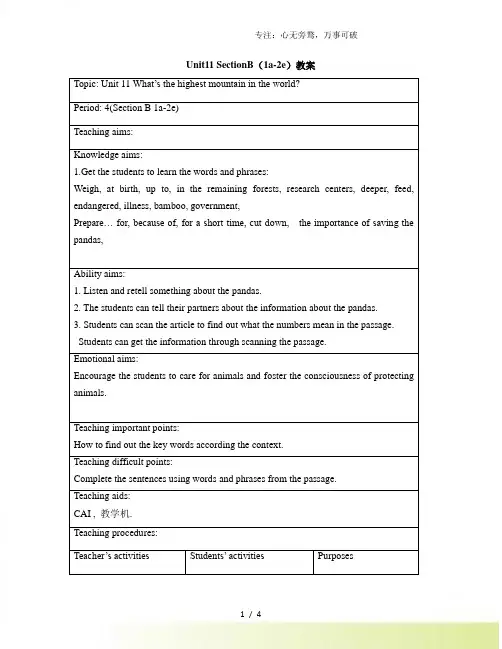
Unit11 SectionB(1a-2e)教案Topic: Unit 11 What’s the highest mountain in the world?Period: 4(Section B 1a-2e)Teaching aims:Knowledge aims:1.Get the students to learn the words and phrases:Weigh, at birth, up to, in the remaining forests, research centers, deeper, feed, endangered, illness, bamboo, government,Prepare… for, because of, for a short time, cut down, the importance of saving the pandas,Ability aims:1. Listen and retell something about the pandas.2. The students can tell their partners about the information about the pandas.3. Students can scan the article to find out what the numbers mean in the passage. Students can get the information through scanning the passage.Emotional aims:Encourage the students to care for animals and foster the consciousness of protecting animals.Teaching important points:How to find out the key words according the context.Teaching difficult points:Complete the sentences using words and phrases from the passage.Teaching aids:CAI , 教学机.Teaching procedures:Teacher’s activities Students’ activities PurposesStep 1 Revision1. Revise the animals’ names. Students try to answer theteacher’s questions.Help to revise how tosay the animals inEnglish.Step 2 PresentationTeacher presents some pictures and some information about the animals. Students use the comparativedegree to compare theanimals.Help the students tofoster necessary skillsfor the listening.Step 3 Listening1.Get the students tolisten to ListeningCassette 1b and finishoff the answers.2.Get the students tolisten to theconversation again andcomplete thesentences. 1.Listen and check thenumbers.2. Listen and complete thesentences.To train Ss’ listeningskills by listening fornumbers.To train Ss’ listeningskills by listening forthe key words.Step 4 retellGet the students to retell the information about the baby pandas. Students retell theinformation about the babypandas according the 1c.Help to deepen theinformation about thepandas.Step 4 Fast reading Teacher shows on the screen some numbers and ask Ss to scan the article to find out what these Read the passage fast andfind out what these numbersmean.10.12.200.20XXSs scan the article again andHelp the students tofoster the ability ofscanning the readingmaterial.numbers mean..Get Ss to scan the passage and finish 2c. write short answers to the questions:What is Wei’s job?What do the baby pandas eat for breakfast?What do adult pandas eat? Why are pandas endangered? What is one way of saving pandas?Step 5 Intensive readingGet the Ss to read the passage after the tape and pay attention to some difficult points. Ss read after the tape andmake some notes about thedifficult points.To help the Ssunderstand the wholepassage better.Step 6 post readingGet the students to read the passage fast to find out the answers and finish 2d. Read the passage fast finish2d.Help the students tounderstand the passageby using their ownlanguage.Step 7 homework 1. 复述2d2. 作业本(2)P27 I II3. 预习P52 4a 并完成4. dictation Consolidate what learnt today.Bb designUnit 11 What’s the highest mountain in the world?Period 4 (Section B 1a -2e) Weigh, at birth, prepare… for,up to, for a short time,in the remaining forests, because of,research centers, feed, cut down, endangered, the importance of saving the pandas, illness ,bamboo, government,教学反思:。
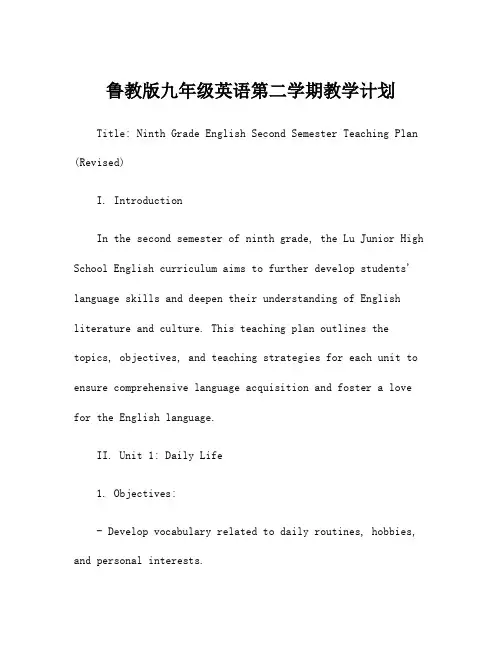
鲁教版九年级英语第二学期教学计划Title: Ninth Grade English Second Semester Teaching Plan (Revised)I. IntroductionIn the second semester of ninth grade, the Lu Junior High School English curriculum aims to further develop students' language skills and deepen their understanding of English literature and culture. This teaching plan outlines the topics, objectives, and teaching strategies for each unit to ensure comprehensive language acquisition and foster a love for the English language.II. Unit 1: Daily Life1. Objectives:- Develop vocabulary related to daily routines, hobbies, and personal interests.- Enhance speaking and listening skills through interactive activities.- Improve reading and writing skills through various texts, including interviews, descriptive paragraphs, and personal narratives.2. Teaching Strategies:- Engage students in group discussions and pair work to practice using new vocabulary.- Conduct role-play activities to simulate real-life situations.- Assign reading tasks and analysis exercises to promote critical thinking.III. Unit 2: Communication1. Objectives:- Enhance communication skills in both formal and informal settings.- Teach effective negotiation techniques and ways to express opinions.- Improve writing skills through formal letter and email writing.2. Teaching Strategies:- Provide scenarios for students to practice expressing and defending their opinions.- Assign group activities for students to negotiate and reach a consensus.- Teach formal language structures for letter and email writing.IV. Unit 3: Literature Appreciation1. Objectives:- Introduce students to classic and contemporary English literature.- Develop reading comprehension skills through analysis and interpretation.- Foster creativity by encouraging students to write and present their own stories.2. Teaching Strategies:- Organize group reading sessions followed by discussions and analysis.- Assign reading reflections to encourage personal connections with the literature.- Conduct creative writing workshops and peer critiques.V. Unit 4: Media and Technology1. Objectives:- Teach vocabulary related to media, technology, and social media.- Develop critical thinking skills by analyzing different types of media.- Enhance writing skills through writing articles and expressing opinions.2. Teaching Strategies:- Engage students in debates and discussions on the pros and cons of technology.- Assign group projects to create media campaigns or podcasts.- Analyze articles and news reports to develop media literacy.VI. Unit 5: Global Issues1. Objectives:- Introduce global issues such as climate change, poverty, and human rights.- Improve research skills through data collection and analysis.- Enhance speaking skills through class debates and presentations.2. Teaching Strategies:- Assign debates and presentations on different global issues.- Organize group projects to research and propose solutions to real-world problems.- Offer guidance on reliable sources and citation formats for research papers.VII. Unit 6: Review and Assessment1. Objectives:- Consolidate knowledge and skills acquired during the semester.- Provide assessment opportunities to measure student progress.- Ensure students are well-prepared for the final examination.2. Teaching Strategies:- Conduct comprehensive review sessions in the form of games, quizzes, and discussions.- Assign practice exams to familiarize students with the format and expectations.- Provide individualized feedback to address any areas of improvement.VIII. ConclusionThis revised teaching plan for the second semester of ninth-grade English aims to create a conducive learning environment where students can develop their language skills, engage with literature, and explore global issues. Byincorporating a variety of teaching strategies and assessments, students will be prepared for the challenges of high school and beyond.。
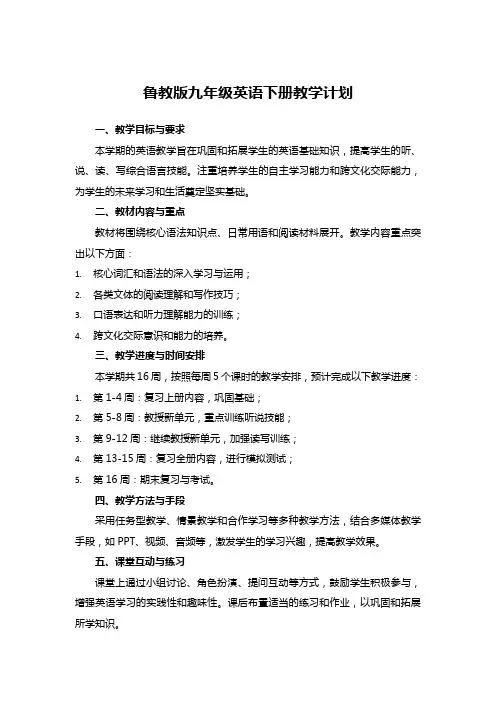
鲁教版九年级英语下册教学计划一、教学目标与要求本学期的英语教学旨在巩固和拓展学生的英语基础知识,提高学生的听、说、读、写综合语言技能。
注重培养学生的自主学习能力和跨文化交际能力,为学生的未来学习和生活奠定坚实基础。
二、教材内容与重点教材将围绕核心语法知识点、日常用语和阅读材料展开。
教学内容重点突出以下方面:1.核心词汇和语法的深入学习与运用;2.各类文体的阅读理解和写作技巧;3.口语表达和听力理解能力的训练;4.跨文化交际意识和能力的培养。
三、教学进度与时间安排本学期共16周,按照每周5个课时的教学安排,预计完成以下教学进度:1.第1-4周:复习上册内容,巩固基础;2.第5-8周:教授新单元,重点训练听说技能;3.第9-12周:继续教授新单元,加强读写训练;4.第13-15周:复习全册内容,进行模拟测试;5.第16周:期末复习与考试。
四、教学方法与手段采用任务型教学、情景教学和合作学习等多种教学方法,结合多媒体教学手段,如PPT、视频、音频等,激发学生的学习兴趣,提高教学效果。
五、课堂互动与练习课堂上通过小组讨论、角色扮演、提问互动等方式,鼓励学生积极参与,增强英语学习的实践性和趣味性。
课后布置适当的练习和作业,以巩固和拓展所学知识。
六、测评与反馈机制通过单元测试、期中考试和期末考试等多种方式,定期评估学生的学习成果。
及时给予反馈和指导,帮助学生发现问题并改进学习方法。
七、学习策略与指导引导学生制定合理的学习计划,培养良好的学习习惯。
教授有效的学习策略,如记忆技巧、阅读技巧等,帮助学生提高学习效率。
八、文化交流与拓展结合教材内容,介绍不同国家的文化和风俗习惯,提高学生的跨文化意识。
鼓励学生通过观看英文电影、阅读英文书籍、参加英语角等方式,拓展自己的视野和知识面。
通过本学期的精心教学,我们期待学生能够在英语学习中取得显著进步,为未来的学习和生活奠定坚实基础。
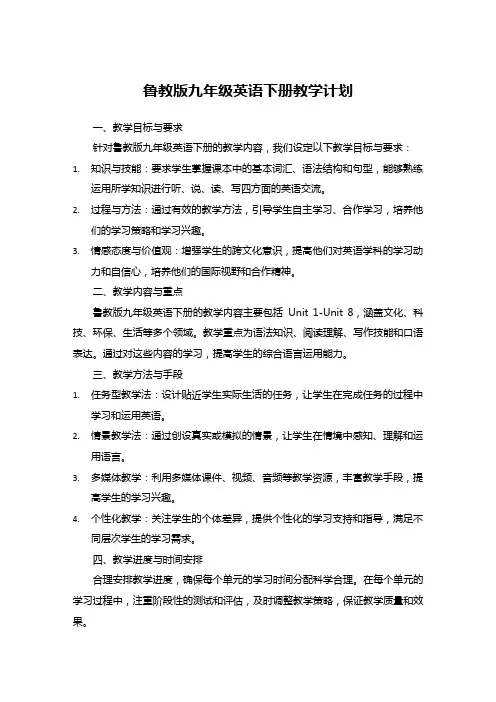
鲁教版九年级英语下册教学计划一、教学目标与要求针对鲁教版九年级英语下册的教学内容,我们设定以下教学目标与要求:1.知识与技能:要求学生掌握课本中的基本词汇、语法结构和句型,能够熟练运用所学知识进行听、说、读、写四方面的英语交流。
2.过程与方法:通过有效的教学方法,引导学生自主学习、合作学习,培养他们的学习策略和学习兴趣。
3.情感态度与价值观:增强学生的跨文化意识,提高他们对英语学科的学习动力和自信心,培养他们的国际视野和合作精神。
二、教学内容与重点鲁教版九年级英语下册的教学内容主要包括Unit 1-Unit 8,涵盖文化、科技、环保、生活等多个领域。
教学重点为语法知识、阅读理解、写作技能和口语表达。
通过对这些内容的学习,提高学生的综合语言运用能力。
三、教学方法与手段1.任务型教学法:设计贴近学生实际生活的任务,让学生在完成任务的过程中学习和运用英语。
2.情景教学法:通过创设真实或模拟的情景,让学生在情境中感知、理解和运用语言。
3.多媒体教学:利用多媒体课件、视频、音频等教学资源,丰富教学手段,提高学生的学习兴趣。
4.个性化教学:关注学生的个体差异,提供个性化的学习支持和指导,满足不同层次学生的学习需求。
四、教学进度与时间安排合理安排教学进度,确保每个单元的学习时间分配科学合理。
在每个单元的学习过程中,注重阶段性的测试和评估,及时调整教学策略,保证教学质量和效果。
五、课堂互动与练习1.课堂互动:鼓励学生积极参与课堂讨论和互动,提高他们的口语表达能力和思维逻辑能力。
2.课堂练习:设计多样化的课堂练习,巩固所学知识,提高学生的语言运用能力。
六、评估与反馈机制1.定期评估:通过课堂小测验、单元测试和期中期末考试等方式,定期评估学生的学习成果,了解他们的掌握情况。
2.及时反馈:对学生的作业和测试进行及时批改和反馈,指出存在的问题和需要改进的地方,帮助学生及时纠正错误,提高学习效果。
七、学习资源与支持为了更好地辅助教学,我们将充分利用各种学习资源,如课本、教辅资料、网络资源等。
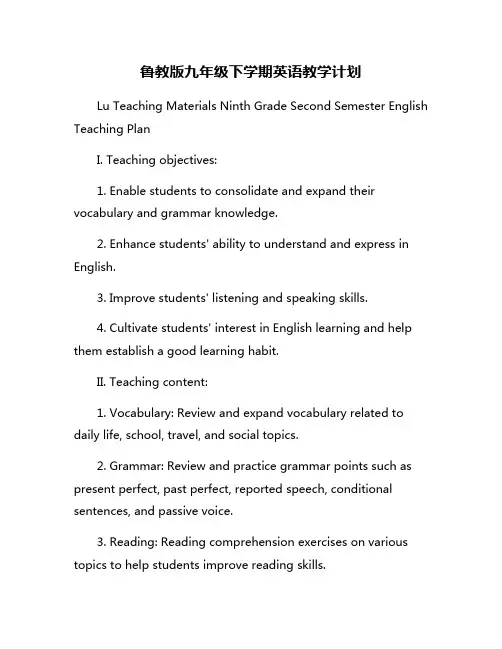
鲁教版九年级下学期英语教学计划Lu Teaching Materials Ninth Grade Second Semester English Teaching PlanI. Teaching objectives:1. Enable students to consolidate and expand their vocabulary and grammar knowledge.2. Enhance students' ability to understand and express in English.3. Improve students' listening and speaking skills.4. Cultivate students' interest in English learning and help them establish a good learning habit.II. Teaching content:1. Vocabulary: Review and expand vocabulary related to daily life, school, travel, and social topics.2. Grammar: Review and practice grammar points such as present perfect, past perfect, reported speech, conditional sentences, and passive voice.3. Reading: Reading comprehension exercises on various topics to help students improve reading skills.4. Writing: Writing tasks such as essays, letters, and diary entries to enhance students' writing skills.5. Listening: Listening exercises to improve students' listening skills and ability to understand spoken English.6. Speaking: Speaking tasks such as discussions, presentations, and role plays to improve students' spoken English.III. Teaching methods:1. Communicative approach: Emphasize interaction and communication in English learning.2. Task-based learning: Engage students in tasks that require them to use English in real-life situations.3. Group work: Encourage students to work in groups to practice speaking and collaboration skills.4. Multimedia: Use multimedia resources such as videos, audio clips, and online resources to enhance learning.5. Games and activities: Incorporate games and activities to make learning fun and engaging.IV. Assessment and evaluation:1. Regular quizzes and tests to assess students' understanding of the content.2. Participation in class activities and group work.3. Assignments and projects to evaluate students' writing and speaking skills.4. Final exams to evaluate students' overall English proficiency.V. Resources and materials:1. Textbooks: Lu Teaching Materials Ninth Grade Second Semester English2. Supplementary materials: Online resources, audio and video clips, worksheets, and games.3. Technology: Smartboards, computers, and other multimedia devices to enhance learning.VI. Timeline:1. Week 1-4: Review and expand vocabulary and grammar.2. Week 5-8: Reading comprehension exercises.3. Week 9-12: Writing tasks and speaking activities.4. Week 13-16: Listening exercises and final review.5. Week 17-18: Final exams and assessment.By following this teaching plan, we aim to help students improve their English skills and achieve success in their language learning journey.。
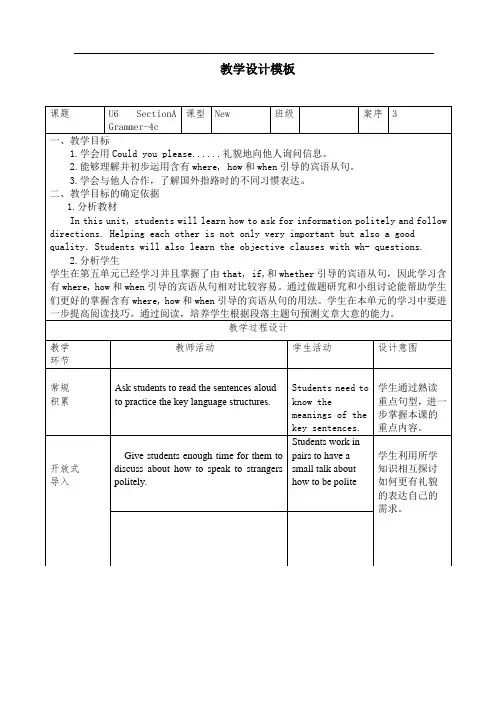

鲁教版九年级下学期英语教学计划全文共5篇示例,供读者参考鲁教版九年级下学期英语教学计划篇1一、让学生爱上英语课,自觉学英语我们的学生来自于农村,很多学生接触英语慢,而且基础又不是很好,进入初三的英语学习中,不仅内容多且复杂,而且要背的单词、词组、语法知识更多,有的单元新单词就达到70个之多。
我们(6)班的13位男生和5位女生的英语基础很差,平时又懒得记单词等,甚至有几位男生都放弃英语了,而(1)班的学生成绩普遍差点,真正想学英语的就是那么10来个人,班里学习英语的气氛不是很浓,学习自觉性较差。
针对以上情况,要改变这种局面,我们觉得培养学生的兴趣和学习习惯很重要,要让我们的学生爱上英语课,爱记单词等。
因而在教学中我在这些方面做了不少努力。
培养学生课前多预习,课堂上集中注意力听讲,把老师讲的内容真正听懂。
不能似懂非懂。
课后认真完成配套的巩固练习,不懂的地方,多向老师或成绩稍好的学生请教等。
晨读时间由老师或英语课代表带领学生大声朗读、老师抽查背诵,班会时间让学生根据给出的英文题目进行口头作文,课后或晚修时间定量完成英语练习等。
同时教给学生一些学习技巧,灵活掌握学过的知识点,举一反三,融会贯通等。
而且我们还在班级中举行词汇竞赛,听力竞赛和英语作文竞赛等,只要学生有进步就有一定的奖励等等。
只有这样,才能培养学生学习英语的激情和习惯。
二、借助多媒体等设备,提高教学质量因为课堂是我们教学的主阵地,课堂教学的成败直接影响着教学效果。
所以我们在课前各个老师都要准备好课件等,课堂上设法吸引学生,不让其分心,上课内容力求丰富,现实。
教态自然,讲课生动,难易适中照顾全部。
另外,我每天都坚持保持充足的精神,让学生感受到一种积极上进的气氛。
在课堂上采用多种教学方式,如情景教学法,任务型教学法等,本人根据教学内容使用不同的方法,充分调动学生的积极性,加强师生交流,使他们能在轻松、愉快、合作、交流中学到知识。
根据不同学生设计不同层次的问题,树立学生的自信心,让各层次的学生都得到提高。
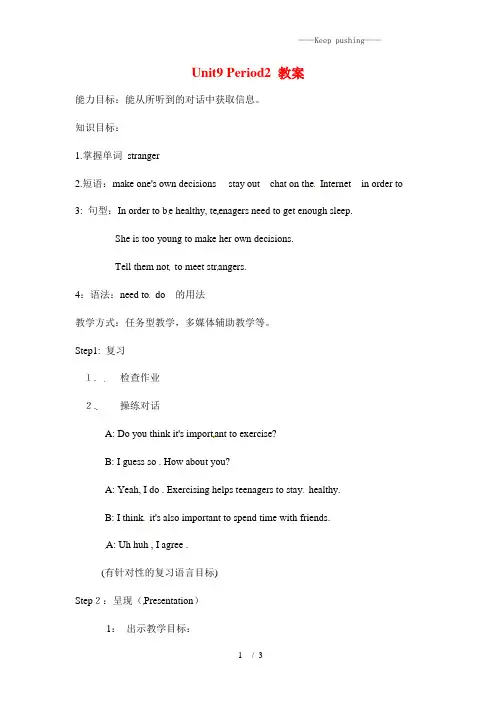
Unit9 Period2 教案能力目标:能从所听到的对话中获取信息。
知识目标:1.掌握单词stranger2.短语:make one's own decisions stay out chat on the Internet in order to 3: 句型:In order to b e healthy, te enagers need to get enough sleep.She is too young to make her own decisions.Tell them not to meet strangers.4:语法:need to do 的用法教学方式:任务型教学,多媒体辅助教学等。
Step1: 复习1. 检查作业2. 操练对话A: Do you think it's import ant to exercise?B: I guess so . How about you?A: Yeah, I do . Exercising helps teenagers to stay healthy.B: I think it's also important to spend time with friends.A: Uh huh , I agree .(有针对性的复习语言目标)Step2:呈现(Presentation)1:出示教学目标:(1)掌握单词strang er(2)短语:make one's own decisions stay out chat on the Internet in order to(3)句型:In order to be healthy ,teenagers need to get enough sleep .She is too young to make her own decisions .Tell them not to mee t strangers .(4)语法:need to do 的用法2:让学生把2a , 2b内容先浏览一遍,找出学习目标中的单词、短语、句型,做到心中有数。
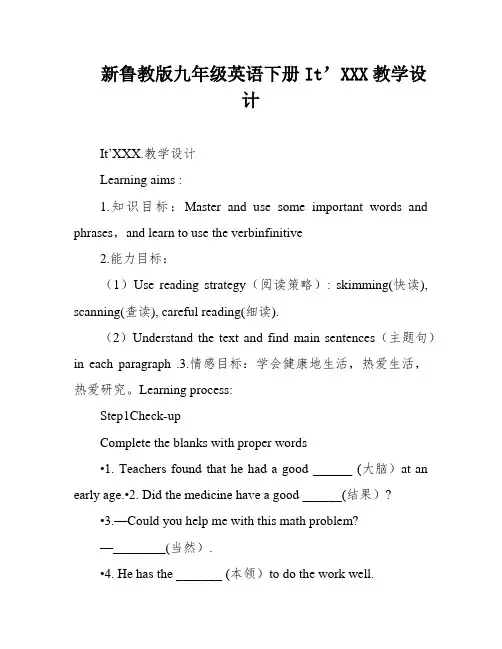
新鲁教版九年级英语下册It’XXX教学设计It’XXX.教学设计Learning aims :1.知识目标:Master and use some important words and phrases,and learn to use the verbinfinitive2.能力目标:(1)Use reading strategy(阅读策略): skimming(快读), scanning(查读), careful reading(细读).(2)Understand the text and find main sentences(主题句)in each paragraph .3.情感目标:学会健康地生活,热爱生活,热爱研究。
Learning process:Step1Check-upComplete the blanks with proper words•1. Teachers found that he had a good ______ (大脑)at an early age.•2. Did the medicine have a good ______(结果)?•3.—Could you help me with this math problem?—________(当然).•4. He has the _______ (本领)to do the work well.•5. The _______(数量)of the money they wasted was very large .XXX.1.在…告竣共鸣2.很明显…3.日常生活4.在…的中央5.十分钟的小睡6.对…有严重影响7.在…有困难8.为了,为的是9.最好(不)做某事10. …的数量11.因人而异【设计意图】我校一直倡导学生自主研究惯的培养,自主预一直是我们培养学生自主研究的能力之一,为此我们每节课都会有一个预检测,旨在检查学生的预情况,同时也是督促学生预惯的养成,做到有布置有检查。
本文由一线教师精心整理/word 可编辑1 / 1Unit11 SectionB (3a-3b )教案Topic: Unit 11 What’s the highest mountain in the world? Period: 5 (Section B 3a-3b) Teaching aims: Knowledge aims:1.Get the students to learn the words and phrases:Huge, whale, jump high out of the water, stop putting rubbish into the seaAbility aims:1. write a passage about the whales.2. know more about the endangered animals. Emotional aims:Help students to form a right attitude toward the endangered animals. Teaching important points:Can put the phrases in the proper preposition. Teaching difficult points:How to put the phrases in the proper preposition. Teaching aids: CAI ,Teaching procedures: Teacher’s activities Students’ activities Purposes Step 1 Revision Retelltheinformation about the pandas.Students try to retell the story.Help to revise what they learnt in last period.Step 2 Activity 3a Teacher presents some pictures of whales.Get the students to read and put the phrases in the correct place in the chart.Students listen and learn some information about the whales.Ss put the phrases about whales and put them in the correct place in the chart.Help the students to learn some about the whales.Step 3 Activity 3b Get the students to write a paragraph about the whale and why they need to be protected.Students write a paragraph about the whale and why they need to be protected. Se the information in 3a. Then make a poster.Help the students to learn how to write a passage according to the information given. Step 4 post writingGet the students to read their composition to their partners.Students readtheir composition to their partner and ask them to make some correct.Help the students tounderstandthecomposition better. Step 5 Exercise Finish offthe correspondent exercise for this period.Polish their composition andcopy it in the compositionbook.Bb designUnit11 What’s the highest mountain in the world? Period 5 (Section B 3a-3b)jump high out of the water stop putting the rubbish into the sea. huge live in the sea. in danger=endangered.。
Unit 10 It's important to have a healthy lifestyle课题Unit 10It’s important to havea healthy lifestyle.课时 1 课型新授课教学目标1.Knowledge Objects(1)Key V ocabulary: provide, firm, offer, spot, Confucius, stele, forest The Forest of Steles(2)Reading practice using the target language(3)Writing practice using the target language 2.Ability Objects(1)Train students’ reading skill.(2)Train students’ writing skill.(3)Train students’ listening and speaking skills.3.Moral Object:Are you planning to take a trip this summer?Write an e-mail to a travel agency in English to get some information on vacations.重点难点分析及突破措施教学重点:1.The new vocab ulary.2.Read an e-mail.3.Write an e-mail.教学难点:Write an e-mail.突破措施:1.Scanning the e-mail to find out the answers2.Writing 3.Groupwork教具准备No板书设计Unit 10It’s important to have a healthy lifestyle.Section BThe Fifth PeriodAnswers to Activity 3a:1. F 2. F 3. DK 4. DK 5. T 6. FQuestions on the e-mail in Activity 3a:1. Wher e do S.T. Zhang and the family want to take a trip?2. What kind of place do they want to go to?3. What exercise do they especially love doing?4. What does S.T. Zhang say about the hotel they want to live in? 5. What does S. T. Zhang want the travel agency to do?6. How long would they like to be away?17教学过程(包括导引新课、依标导学、异步训练、达标测试、作业设计等)Step Ⅰ Revision1. Revise the conversation in Activity 2c on page 55 by making a conversation with one student like this,T: Where would you like to go?Ss: I’d like to go somewhere relaxing.T: What else can you tell me?S: I don’t want to go to big noisy cities.After that, ask them to practice in pairs.Ask several pairs to share their conversations with the whole class.2. Check their homework.Step Ⅱ 3aThis activity provides reading practice using the target language.At first, introduce the key vocabulary words.Teach students to read the words and expressions several times. Then ask several to read t o the class. Make sure that they can read the words fluently and correctly.Read the instructions to students. Make sure that each student knows what they will have to do.Go over the statements about the e-mail message with the whole class. Make sure that they can understand all the six sentences in the box. An d tell them to put the six statements in their minds while they scan the e-mail below.Say, Boys and girls, please scan the e-mail in Activity 3a now. Try to get the main idea of the letter and find out the answers to the statement s. Ask them to scan the letter individually, and write T, F or DK before each statement.After they’ve all finished scanning, check the answers with the whole class. Elicit why the false sentences are false at the same time.After checking the answers, tell the children to read the passage more carefully and prepare to answer th e questions on the blackboard.After they’ve all finished reading, get some students to answer these questions.Encourage them to a sk questions on what they don’t understand about the e-mail.Ask one student to read the letter to the class. Help him or her with the pronunciation. Then let all the students read the passage several times.Step Ⅲ 3bRead the instructions to students.Ask: Who can explain the instructions in your own language?Choose two or three among those who have put up their hands to explain the instructions in English.They may say like this, Suppose I work for Ace Travel Agency and I have received the letter from S.T. Zhang. Then it is my duty to reply the e-mail and I have to tell where they should go on vacation.After they all know what to do, get them to begin writing. Move around the classroom as they write, offering help if necessary. Remember whose passage is excellent and prepare to ask them to read theirs to the class.After they’ve all finished writing, ask the students who have written very good passages to read theirs to the class.Let them work in pairs to correct the mistakes in the passage they’ve writt en.Tell them that they have to rewrite the letters after class and bring them to school tomorrow. 18Step Ⅳ Part 4Read the instructions to students.Say something about the three places in the chart. Showing some pictures of these places to the students, say like this, Qufu is a small city in Shandong Province.It is famous for Confucius.It was Confucius’ hometown. He was born there.The Great Wall is the pride of the Chinese people. It is very long and it is hard to believe that it was built over two thousand years ago.The Forest of Steles in Xi’an is a great place for people who are interested in writing Chinese with brushes.What do you think of the three places?Look at the chart in Activity 4. We can see the sample answer in the box about Qufu in the column of you.Continue saying, Now please fill in the boxes about The Great Wall and The Forest of Steles in Xi’an on your own.You can use the words above the chart or any other word.Tell them to write out the three students’ names in the pro per places in the chart.Then get them to survey the three students. Le t them work in groups of four.Ask a pair of students to read the model conversation in Activity 4 before they begin their own ones.At last, have several groups r eport the results to the class. Then ask the class where they would prefer to go together.Step Ⅴ SummaryIn this class, we’ve read an e-mail to a travel agency and we’ve also written an e-mail. And we’ve done some reading, writing, listening and speaking practice using the t arget language through group work.Step Ⅵ Homework1. Rewrite the e-mail which you wrote in class.2. Try to remember the new words and expressions on page 56.19教学后记(包括达标情况、教学得失、改进措施等)。
Unit 10 It's important to have a healthy lifestyle课题Unit 10It’simportant to havea healthylifestyle.课时 1 课型新授课教学目标1. Knowledge Objects(1) Key Vocabulary:touristy, spotlight" Singapore, beautiful, heavy, private, downtown, get around, Pack, light(2)Target Language:Where would you like to go, Kathy?I’d like to visit Kunming.重点难点分析及突破措施教学重点:1. Guide students to read the passage in Activity 3a.2. The new vocabulary教学难点:Help students to talk to their partners about the cities they know.突破措施:1. Teaching by illumination.2. Teaching by asking questions.教具准备no板书设计Unit 10It’s important to have a healthy lifestyle.?Section AThe Third PeriodQuestions to Activity 3a:1. What doesn’t Singapore have?2. What does Singapore have?3. Is Singapore also a wonderful place for shopping?4. What don’t you plan on doing in Singapore? Why?5. What is easiest to do in Singapore?6. What is suggested to bring if you decide to go there? Why?Sample answers to Activity 4:Dalian Things you like 1. wonde rfulbeaches2. long coast3. big and nice parks4. the big museum of different kinds of sea animalsThings you don’t like1. things are too expensive2. too many cars running in the streets9教 学 过 程(包括导引新课、依标导学、异步训练、达标测试、作业设计等)Step Ⅰ Revision1. Revise the target language they learned last class by asking Where would you like to go on vacation? Get several children to answer I’d liketo…because…2. Check the homework by asking some children to read the conversations theywrote to the class.Step Ⅱ 3aAt first introduce the key vocabulary words. Teach studen ts to read the vocabulary several times until they can read them out easily and correctly.Read the passage quickly and try to answer the questions on the blackboard.Write these questions on the blackboard:1. What doesn’t Singapore have?2. What does Singapore have?3. Is Singap ore also a wonderful place for shopping?4. What don’t you plan on doing in singapore? why?5. What is easiest to do in Singapore?6. What is suggested to bring if you decide to go there? Why?A few minutes later(maybe two or three minutes), ask different students to answerthe questions.Play the video tape of Singapore for students or show them some pictures.Next, read the instructions to students.Say, What things do you like about visiting Singapore and what things don’t you like? Read the passage again. Circle the things you like about visitingSingapore and underline the things youdon’t like.Get them to finish the activityon their own.Check the answers.Step Ⅲ 3bRead the instructions to students. Make sure that they know what to do.Ask two students to read the sample conversation on the left in Activity 3b, Note to corr ect any pronunciation errors to make sure the students are providing a good model forthe rest of the class.Ask another pair to model a conversation with the first group of words on the right, the words in the first line. Listen to them carefully with the whole class to see if they can put the words in the proper places. Then let the whole cl ass practice in pairs. Each pair should make up four conversationswith the information on the right. Walk around the classroom as the students are working. Listen to some pairs and see if they have met any problems. Offer some help as needed. After all the students have finished practicing, ask some more pairs to share their conversations withtheir classmates.Step Ⅳ Part 4Read the instructions t o the children.Make sure that t hey understand it.Say, First think of a city you know, everyone. I think of Dalian. What aboutyou?Ask several ones to tell the names of the cities they’ve thought of.Then say, Please write down the name of the city you’ve thought of on theline above c ity name in the chart.After that, show some photos of Dalian to the students around the room. Then continue saying, Dalian is a very beautiful city with wonderful beaches. It has very long coast. It also has quite a few big and nice parks. Some arenear the sea and some are not. 10I like the big museum of different kinds of seaanimals, too. What about you? What do you like about the cities you’ve written in your book?Ask two or three to say something about their cities.Then say, Now please fill in the left box with the things you like about the city.I’ll write mine on the blackboard, you can use it as a sample.Write the sample on the blackboard, and students write out theirs.Walk around the classroom and direct them to write.After all of them have finished, go on with the third step.Now talk to your partner about the things you don’t like.After they finish talking, go on saying something I don’t like about Dalianto them.For example, The things in Dalian are too expensive.They are for the rich. And there are too many cars running on thestreets. It’s very hard for people to cross a street.Can you say something you don’t like about your cities?Ask some to say something on that to the class. Then tell them to fill in the b ox for things you don’t like. Let them talk to their partners about it.Step Ⅵ SummaryIn this class, we’ve learned something about Singapore, and we’ve talked about some other places all over the world.We’ve done a lot of listening, speaking, reading and writing practice using the target l anguage.Step Ⅶ Homework1. Write a short passage on the city you talked about in class.2. Try to remember the new words on page 54.。
Unit8 SectionA(1a-2d)精品教案I. PresentationShow the picture of the earth and tell students the earth is polluted now.For example: (1) The factories that burn coal pollute the air with a lot of black smoke.(2) Factories put waste into the river.(3) People should throw away litter in the bin.(4)There are more cars on the road.II. LearningHere are some words related to different kinds of pollution. Write them in the box below. Then add more words.loud music cars rubbish planes littering ships factories smoking building houses mobile phonesnoise pollution air pollution water pollution____________ ___________ _________________________ ___________ _________________________ ___________ _________________________ ___________ _____________Keys : noise pollution loud music planes mobile phones building housesair pollution factories smoking cars building houseswater pollution ships rubbish littering factoriesIII. Listening1. 1b Listen and complete the sentences.Keys: really dirty rubbish fish litter waste government close down clean up2. Listen again and check (√) the sentences you hear.1) We could go fishing in the river.2) The river was really dirty.3) The river has always been the nicest river in this town.4) We should ask the teachers for help.Keys: 2 3IV. Practice1. Role-play the conversation in 1c.Mark: The river was dirty. Even the bottom of the river was full of rubbish. Tony: But it used to be so clean!Mark: Yes, but people are throwing litter into the river.Tony: Everyone in this town should play a part in cleaning it up!2. Make conversations using the pollution in 1a.A: The river has always been the nicest river in this town.B: Yes, it used to be so clean.A: But I was there last weekend and the river was really dirty.B: What caused the problem?A: People are throwing litter into the river.B: What should we do?A: Factories are also putting waste into the river.B: Yes, everyone in this town should play a part.A: We should write to the government and ask them to close down the factories. B: What else can we do?A: Everyone should help to clean up the river.V. Language points1. We’re trying to save the earth!我们正在竭尽全力拯救地球!try to do =try one’s best to do 努力去做某事。
e.g. Every student should try to study hard in order to study in a university.为了进入大学学习,每个学生都应该努力学习。
2. Here are some words related to different kinds of pollution.be related to 与…有关e.g. I am not related to him in any way. 我和他无任何关系。
3. Everyone in this town should play a part in cleaning it up!play a part in 在……方面起作用e.g. A good diet plays a large part in helping people live longer.健康的饮食在帮助人们长寿方面起着非常大的作用。
play a part 在……中扮演角色e.g. He was invited to play a part in this TV play.他被邀请参加这个电视剧的演出。
4. Even the bottom of the river was full of rubbish.Yes, but people are throwing litter into the river.litter 和rubbish 都可指“垃圾”,用作不可数名词。
rubbish 指“没用的东西(被扔或将要丢弃的无用的东西)”不可回收。
litter 指“(室内或公共场所)乱扔的废物(纸屑、不要的包装纸、废瓶等)”还可回收e.g. Throw the rubbish out. 把垃圾扔出去。
The room is full of rubbish. 房间里堆满了垃圾。
Pick up your litter after a picnic. 野餐后将废弃物收拾好。
VI. Listening1. 2a Listen to the interview. Circle the kinds of pollution that Jason and Susan talk about.A. land pollutionB. air pollutionC. noise pollutionD. water pollutionKeys: B A2. 2b Listen again and complete the sentences.1) The air is badly polluted because there are ___________ on the road these days.2) Factories that burn coal also ________ the air with a lot of black smoke.3) There is also too much rubbish and waste. People _________________ things every day.4) People are also littering in ______________ like parks. This is turning beautiful places into ugly (丑陋) ones.Keys: more cars pollute are throwing away public places3. Listen and answer the questions.1) Who is the interviewer talking to?2) What are they talking?3) What other problems do they see?Keys: Susan and Jason.The environmental problems.There’s too much rubbish and waste in the streets.VII. Practice (2c)Use the information in 2a and 2b to role-play conversations between Jason andSusan.Jason: The air has become really polluted around here. I’m getting very worri ed. Susan: Yes, I used to be able to see stars in the sky.Jason: The problem is that…VIII. DiscussionAsk students what we should do to save the earth. Help students answer, turn off thelights when you leave a room; stop riding in cars; stop using paper towels or napkins; recycle books and paper.IX. Reading1. Read 2d and complete the chart.2. Role-play the conversation.Interviewer: Jason and Susan, what are your ideas for solving these problems? Jason: Well, to cut down air pollution, we should take the bus or subway instead of driving.Susan: Yeah, or ride a bike. There are other advantages (优点) of bike riding. It’s good for health and i t doesn’t cost (花费) anything!Interviewer: Great ideas! What about waste pollution?Susan: Mmm, I think simple things like bringing a bag to go shopping can help. I started doing that a year ago.Jason: Me, too. Also, I never take wooden chopsticks or plastic (塑料) forks whenI buy takeaway (外卖食品) food. I use the ones at home.Susan: And remember to throw rubbish in the bins and keep public places clean and beautiful for everyone.Interviewer: So together, our actions can make a difference and lead to a better future!X. Summary and language points1. This is turning beautiful places into ugly ones.turn… into… 把……变成……e.g. The icy rain seemed like to turn into snow.渐渐地冻雨又变成雪花的模样。